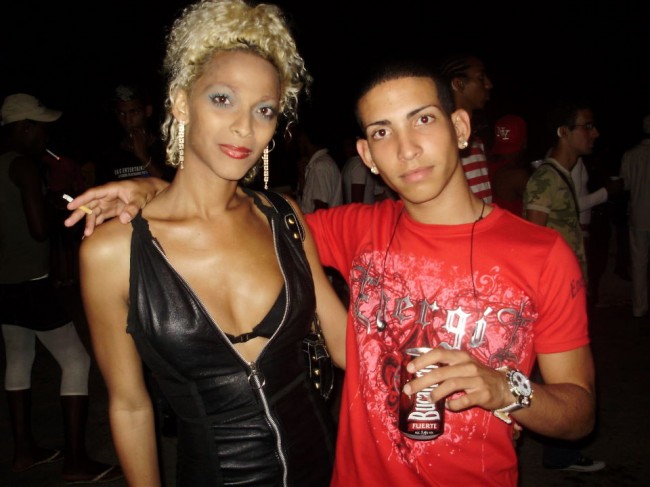
Mariela Castro Espin, 48, Director of the National Center for Sex Education and one of the four children president Raul Castro had with the engineer Vilma Espin, is probably better known overseas than in Cuba. Her conferences and interviews usually receive good press coverage in the nations she visits.
When the island launched a campaign for sex education in 1975, Mariela was 13-years-old. It was her mother, president of the Federation of Cuban Women, who made is possible, thanks to the work and dedication of two experts: the Cuban doctor Celestino Álvarez Lajonchere and Monika Krause, a sexologist from the old German Democratic Republic and inspiration for the film The Queen of the Condom.
In her most recent globe-trotting, through Italy, Switzerland and Germany, the woman who is also Fidel Castro’s niece, said that the next challenge will be to include the rights of gays, transvestites, lesbians and transsexuals in The Family Code. “Hopefully the Santeria God Changó is listening. The situation of gays in Cuba is better than in past years, but they are still a long way from being respected and having full rights, like gays in the developed countries of Europe,” remarked a gay Cuban living in Switzerland.
For two years, there has been talk of including homosexuals in the Family Code. It’s true that the Cuban authorized the celebration of the International Day Against Homophobia, on May 17, as well as sex change operations. Positive actions, but viewed with suspicion among the public, where there are still many prejudices.
Some think homosexuality s a smokescreen. Pure show. And the historic leadership, above all the related General Raul Castro, could be trying to turn his daughter into a presidential figure. It is no secret that she has to opportunity to propose legislative because she is “Papa’s daughter.”
The center that Mariela Castro directs is not a social organization of the masses, like the Committees for the Defense of the Revolution. Nor is it a legal entity recognized by the Constitution to propose laws to the National Assembly of People’s Power, the Cuban parliament.
We can deduce, then, that she would use family relationships to achieve her goals. A possibility not open to any opposition group such as the Christian Liberation Movement, of Oswaldo Payá Sardiñas, who presented the Varela Project in 2002 and was rejected.
Without the intervention of Raul Castro’s daughter would the high levels of power interest themselves in addressing the rights of homosexual Cuban? The gay, lesbian and transvestite Cubans, for that matter, are not organized into state-recognized associations. The possibility that they can be represented in parliament and participate in the political life of the nation is remote.
Other people see the Castro descendant as a public relations official. With a more agreeable presence than other members of the region, her mission would be to show the world that human rights are respected in Cuba. Almost always her declarations echo the foreign media, not the national media.
Inside, things are quite different. The local media do little to raise awareness and promote tolerance toward the homosexual in such a macho society as Cuba’s. A mentality that could change if people could see documentaries on TV like Another Carmen and The Mistaken Body, based on real experiences.
Not everyone on the island agrees with the legal proposals being made by the most famous of the Castro Espins. They argue that other realities have a higher priority, like freedom of expression and association, free access to the internet, and the elimination of permits to leave and enter the country.
Apart from some other criteria, what guarantees could homosexuals have to exercise their rights, if the rest of the human prerogatives recognized in the national legal system are seriously violated? It would be the same as it is with racial discrimination. It is proscribed by the Constitution of the Republic, but no court has jurisdiction to accept a case of racism.
Homophobia is not removed by laws. Meanwhile, gay and transvestite Cubans are the victims of police abuses, of drug addiction, alcoholism and prostitution. In recent times they have become a strong attractive for sex tourists. When it gets dark, it’s enough to walk around the central areas of Havana, like La Rampa and the Malecon, to prove it.
In other times the Malecon was called “the wall of sin,” because heterosexual couples gave loose rein to their ardor along it. Now it’s called “Galapagos Islands,” for the great number of gays and transvestites who meet there at night.
Laritza Diversent and Tania Quintero
Photo: Laritza Diversent
Note: After this article was written, a long interview with Mariela Castro Espin was published on a Swiss site. Mariela Castro lied in Switzerland about the Military Camps in Aid of Production (UMAP)*; the first correction to her assertions appeared in the on-line news magazine Cubaencuentro.
Translator’s note: UMAP was a system of work camps where homosexuals, Jehovah’s Witnesses and others deemed to be hostile to the communist regime were imprisoned. Mariela Castro Espin recently claimed that Fidel Castro was unaware of this.
October 16, 2010
